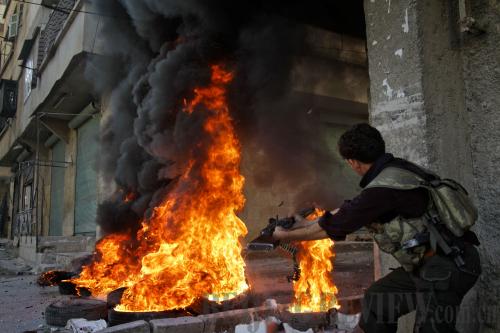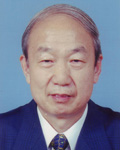|
 |
|
FIRESTORM: A Syrian opposition fighter fires toward government troops during clashes in the northern city of Aleppo on November 13 (XINHUA/AFP) |

The regional situation in the Middle East has remained unstable this year as a variety of conflicts further intensified. Political structures began to reconstitute. Whereas some Arab countries that have undergone transition encountered great difficulties in restoring social stability, Syria's turbulence continued. Regional hotspot issues like the Israeli-Palestinian conflict and the Iranian nuclear issues remained unsettled. But disputes between Sudan and South Sudan eased up. All these developments took place at a time when Washington's capability of handling regional affairs in the Middle East is on the decline.
Challenging transitions
Tunisia, Egypt, Yemen and Libya all managed to establish elected governments following power shifts. All of them now have a pluralized political system, a multi-party mechanism and parliamentary democratic elections. Islamic forces won state power or important seats in parliament. As a consequence, other political forces moved to unite and wrestle power away from the Islamic forces.
In the meantime, economic growth in the four countries has slowed considerably, and people are struggling as their living standard falls. For now, none of the governments of these countries seem capable of drawing up a practical development blueprint.
Moreover, the security situation in these countries is unpromising, as governmental departments cannot function well without strong administrations. Anarchism, extremism and nationalism have gained ground over the past months. Activists often organized demonstrations that threatened to further worsen the crisis.
The top priorities of the four countries' ruling parties are: stabilizing the political situation starting with power distribution by cooperating with other political parties and military forces; reviving their economies, improving people's livelihoods and bringing hope to their people by making workable development plans; and adjusting their foreign policies to project positive images to the outside world.
These ruling parties still need to deal with challenges, such as their relationship with strong military interest groups. Governments of the four countries are working on their independent and balanced foreign policies to keep a distance from Western countries. These tasks will test their administrative capability and wisdom.
Reforms in monarchies
Since the beginning of this year, the six members of the Gulf Cooperation Council (GCC) have been busy carrying out reforms to improve social welfare, women's status and people's livelihoods.
They have paid more attention to infrastructure construction. For example, the six countries planned to invest $30 billion to build a 2,200-km railway network together. They also launched respective railway construction projects at home, with costs of about $106.2 billion. Of these, Saudi Arabia planned to construct 23 high-speed rails with an investment of $25.6 billion, one of which will connect Mecca and Medina.
In countries like Saudi Arabia and Kuwait, the status of women has been visibly raised in political areas. Furthermore, people have more democratic rights in elections and more easily criticize their governments in publications.
Syria's unpredictable future
Syria's political situation has remained in turmoil throughout the year. Military conflicts between government forces and opposition militants have upgraded into a civil war. Casualties rose as battles in big cities intensified. And the Syrian Government's situation is getting more difficult.
In spite of all of these issues, the Syrian Government is still a dominant force, and government troops retain an advantageous position on the war field. Without foreign military intervention or weaponry assistance, it will be impossible for opposition militants to overthrow the country's administration through street-fight-type guerilla tactics, kidnapping, bombings or looting.
Syria's future is unpredictable, but could fall under one of four distinct possibilities.
The first is a normal power shift according to the new Syrian Constitution. The Constitution says each president should have a seven-year term, and each president can have only one extra term. Based on that, Bashar al-Assad will end his term in 2014. Syria's ruling Ba'ath Party supports the multi-party reform. It attended the May 7 parliamentary elections together with other political parties. If the country's political reform goes well, the presidential election will be held by the end of 2013. It is quite possible that Assad will not join the campaign.
| 